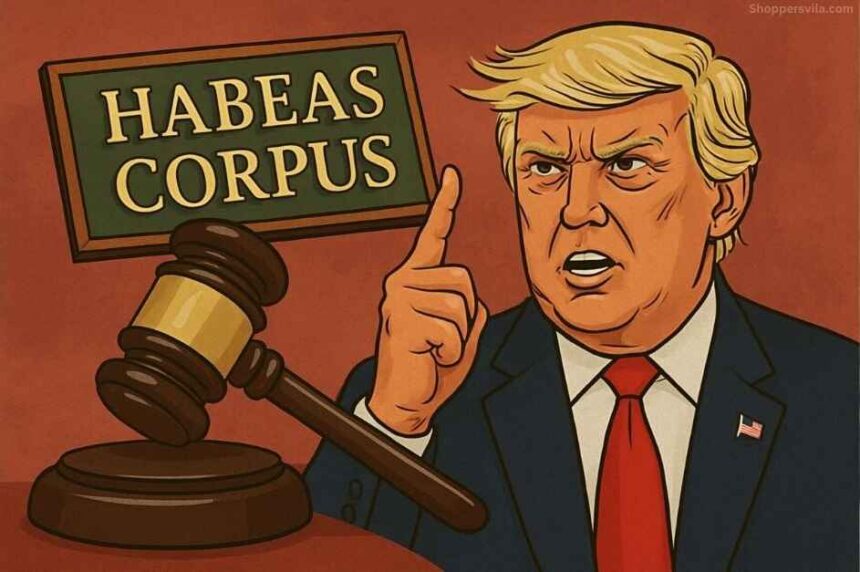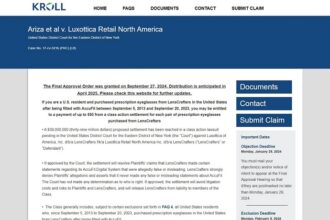The Trump administration has sparked a constitutional controversy with White House adviser Stephen Miller’s announcement that they are considering suspending habeas corpus to accelerate deportations. This potential move threatens one of America’s most fundamental legal protections and raises profound questions about executive power, constitutional boundaries, and the future of immigration enforcement in the United States.
What Is Habeas Corpus and Why Does It Matter?
Habeas corpus—Latin for “you shall have the body”—stands as one of the oldest and most significant safeguards against government overreach in Western legal tradition. This legal principle requires authorities to bring detained individuals before a court to determine if their detention is lawful.
“Habeas corpus is essentially a ‘show me the body’ legal order,” explains Professor Amanda Richardson, constitutional law expert at Georgetown University. “It guarantees a person’s right to challenge their detention before an impartial judge who decides whether there’s legal justification for holding them.”
The writ serves multiple crucial functions in our legal system:
- It prevents arbitrary detention by requiring judicial review
- It ensures transparency in detention processes
- It establishes a check on executive power
- It protects due process rights for all individuals, regardless of citizenship status
The principle was so fundamental to American jurisprudence that the Founding Fathers enshrined it in Article I, Section 9 of the Constitution, which states that “The Privilege of the Writ of Habeas Corpus shall not be suspended, unless when in Cases of Rebellion or Invasion the public Safety may require it.”
The Administration’s Justification: Immigration as “Invasion”
During a White House press appearance, Stephen Miller explicitly connected the potential suspension to immigration enforcement, telling reporters: “The privilege of the writ of habeas corpus can be suspended in a time of invasion. So, to say that’s an option we’re actively looking at… a lot of it depends on whether the courts do the right thing or not.”
The administration has consistently characterized undocumented immigration as an “invasion”—a framing that appears deliberately chosen to align with the constitutional language permitting suspension of habeas corpus during “rebellion or invasion.”
This characterization has been central to the administration’s broader immigration strategy. Executive orders and public statements have repeatedly employed invasion terminology when discussing border security and undocumented immigration.
Critics argue this represents a dangerous misappropriation of constitutional language. “Migration, even unauthorized migration, bears little resemblance to the type of armed invasion the Framers contemplated,” notes immigration attorney Carlos Mendez. “This interpretation stretches constitutional language beyond recognition.”
Legal Battles and Judicial “Obstruction”
The administration’s frustration with what it perceives as judicial obstruction appears to be driving this extraordinary consideration. Miller accused courts of waging a “war” on both executive and legislative branches, citing several specific judicial interventions:
- A federal judge’s intervention in the removal of individuals with temporary protected status
- A Supreme Court ruling that ordered the government to return a deported Venezuelan man
- A federal judge threatening contempt when the administration argued it wasn’t obligated to actively bring the deportee back
These judicial checks have apparently prompted the administration to seek ways to remove courts from the immigration enforcement equation entirely.
Legal experts note this represents a fundamental misunderstanding of constitutional separation of powers. “The courts aren’t obstructing—they’re performing their constitutional duty to ensure executive actions comply with law,” explains constitutional scholar Dr. Martin Jefferson of Yale Law School.
Who Can Legally Suspend Habeas Corpus?
The administration’s consideration raises profound constitutional questions about who has the authority to suspend this fundamental right.
The Constitution’s Suspension Clause is found in Article I, which delineates congressional—not presidential—powers. Legal scholars overwhelmingly agree that only Congress can authorize suspension of habeas corpus, unless Congress explicitly delegates that authority to the president.
Historical precedent supports this interpretation. During the Civil War, President Lincoln initially suspended habeas corpus unilaterally, but this was controversial even during wartime. Congress later authorized Lincoln’s action with the Habeas Corpus Suspension Act of 1863, implicitly confirming that proper suspension requires congressional approval.
“Even if one accepts the dubious premise that migration constitutes ‘invasion,’ the president lacks unilateral authority to suspend habeas corpus,” emphasizes constitutional law professor Elizabeth Chen. “This would require congressional action.”
The administration has not indicated whether it might seek congressional authorization or proceed unilaterally—a distinction with enormous constitutional implications.
Historical Precedents: When Has Habeas Corpus Been Suspended?
The extreme rarity of habeas corpus suspensions throughout American history underscores the extraordinary nature of the administration’s consideration. The writ has been suspended only four times:
- During the Civil War (1861-1865): President Lincoln initially suspended habeas corpus unilaterally, later receiving congressional authorization. The suspension allowed for the detention of Confederate sympathizers and those resisting the draft.
- Reconstruction Era (1871): During efforts to combat Ku Klux Klan violence in South Carolina, President Grant suspended habeas corpus with congressional authorization through the Ku Klux Klan Act.
- Philippines (1905): Following the Philippine-American War, habeas corpus was suspended in two provinces to combat remaining insurgent activity.
- Hawaii after Pearl Harbor (1941): Following the Japanese attack, habeas corpus was suspended in the territory of Hawaii as part of martial law measures.
These historical instances share crucial characteristics: they occurred during periods of actual armed conflict or immediate aftermath, involved violence or armed resistance, and—with the exception of Lincoln’s initial controversial action—received congressional authorization.
“Each historical suspension responded to armed violence on American soil or territories,” notes historian Dr. Sarah Johnson. “None remotely resembles the current immigration situation.”
Potential Consequences for Immigrants and Beyond
If habeas corpus were suspended for immigration cases, the immediate consequences would be severe:
- Individuals could be detained indefinitely without judicial review
- Deportations could proceed without opportunity to verify legal status or asylum claims
- Detention conditions would face reduced oversight
- Mistakes in detention—including detention of citizens or legal residents—would have no ready remedy
But experts warn the implications would extend far beyond immigration:
“Once we normalize the suspension of fundamental constitutional protections in one context, we create dangerous precedent,” warns civil liberties attorney José Ramirez. “Today it’s immigrants, but tomorrow it could be any group deemed problematic.”
Constitutional scholars also note that suspending habeas corpus would represent a dramatic shift in the separation of powers, potentially emboldening future administrations to claim emergency powers that bypass judicial review across various domains.
Legal challenges would inevitably follow any attempt to suspend habeas corpus, setting up a potential constitutional crisis as courts would be asked to rule on their own authority to review detentions.
Frequently Asked Questions
1. Why is the Trump administration considering suspending habeas corpus?
The administration is frustrated with judicial decisions that have slowed or blocked deportation efforts. Stephen Miller, a senior White House adviser, has stated they’re considering suspension to accelerate deportations by removing judicial review from the process. The administration appears to be classifying undocumented immigration as an “invasion” to justify this extraordinary measure under the Constitution’s Suspension Clause.
2. Has habeas corpus been suspended before?
Yes, but only four times in American history—during the Civil War, Reconstruction (to combat Ku Klux Klan violence), in the Philippines in 1905, and in Hawaii after Pearl Harbor. Each case involved actual armed conflict or its immediate aftermath, and most had explicit congressional authorization. No previous suspension targeted immigration enforcement.
3. Can President Trump suspend habeas corpus unilaterally?
Most constitutional scholars say no. The Suspension Clause appears in Article I of the Constitution, which outlines congressional powers, not presidential ones. While President Lincoln initially suspended habeas corpus unilaterally during the Civil War, this was controversial even then, and Congress later authorized the action. The predominant legal view is that only Congress can authorize suspension of habeas corpus.
4. What would happen if habeas corpus were suspended?
Individuals in immigration detention would lose their right to challenge the legality of their detention in court. This could lead to indefinite detention without legal review, accelerated deportations without verification of legal status or asylum claims, and no judicial oversight of detention conditions. Even U.S. citizens mistakenly caught in immigration enforcement would have limited recourse to prove their citizenship.
5. Has the Supreme Court addressed habeas corpus rights for immigrants?
Yes. In cases like INS v. St. Cyr (2001) and Boumediene v. Bush (2008), the Supreme Court has affirmed that habeas corpus protections extend to non-citizens, including those in immigration proceedings. The Court has generally been protective of habeas rights, even during the War on Terror, suggesting any attempt to broadly suspend this protection would face significant judicial scrutiny.
Conclusion: Constitutional Crisis on the Horizon?
The Trump administration’s consideration of suspending habeas corpus represents an extraordinary escalation in its immigration enforcement strategy—one that could trigger a constitutional crisis if implemented.
While frustration with judicial checks is understandable from an administration eager to implement aggressive enforcement policies, these checks exist precisely to ensure that enforcement actions comply with constitutional requirements and established law.
The Founding Fathers included habeas corpus protection in the Constitution because they understood its fundamental importance to liberty and the rule of law. Its suspension has historically been reserved for the most extreme circumstances involving armed conflict on American soil.
As this situation develops, the nation faces profound questions about the limits of executive power, the role of courts in protecting individual rights, and whether immigration challenges—however significant—can legitimately be classified as the type of “invasion” that might warrant the extraordinary step of suspending one of our oldest and most fundamental legal protections.
“The right of habeas corpus has stood as a bulwark against tyranny for centuries,” concludes civil liberties advocate Patricia Wong. “Its potential suspension over immigration disputes should alarm all Americans who value constitutional governance, regardless of their views on immigration policy.”







































